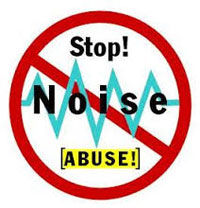THE constant humming of a generator, blaring music sets, that brush-cutter that goes on at 06:00hrs on Saturday morning – these are examples of noise pollution. These situations are common in our communities. Noise pollution refers to sound that goes beyond the acceptable decibel level that may disturb or harm the human or animal life.
Sound is measured in decibels with one decibel being the faintest sound the human ear can hear. Sound becomes undesirable when it disturbs our normal activities such as working, sleeping, and conversing. Chronic or long term exposure to noise can have serious effects on our mental and physical wellbeing.
EPA AND NOISE REGULATION
The Agency has a responsibility to control and manage sound (noise) emissions in Guyana, by setting permissible levels for activities which produce noise such as entertainment, transportation, commercial, and construction activities.
How does EPA manage noise?
Environmental Protection (Noise Management) Regulations 2000
These Regulations were developed under the Environmental Protection Act to protect against noise pollution, and require persons who are engaged in the above-mentioned activities to apply for Environmental Authorisation, so that the Agency can monitor their activities. The Regulations also seek to protect citizens from excessive noise, whatever the source.
The Authorisation Process
Any business engaging in activities which produce noise such as entertainment (night clubs, shows), commercial and construction activities is required to apply for an Environmental Authorisation. If a Permit Holder makes changes in their business operation which will cause an increase in noise levels, then they will be required to obtain approval for a variance from the EPA.
If you are hosting an activity where noise will be generated, then apply for a permit at the Agency. Short-term Noise Permits are granted for single use between the hours of 07:00hrs and 23:00hrs, and typically can be processed within one to two days.
Requirements
* Affidavit from a Justice of the Peace which states the date, time, and location of the event;
* Approval from the Guyana Fire Service;
* NDC/Town Council approval;
* US$20 processing fee
* Note that copies and originals are required for documents
Penalties
It is an offence to cause loud noise in any building, private premises, or vehicle and the Regulations provide for defaulters paying up to $750, 000 in fines and up to one year imprisonment if found guilty. Anyone who is affected by noisy operations can lodge a complaint with the Agency.
Next week we will examine the specific limits according to the regulations and what the Agency has been doing in this regard.
To find out more about the Noise Regulations and other Regulations, visit the EPA’s website at www.epaguyana.org, and remember to be considerate and respectful of others.
Sources
Environmental Protection (Noise Management) Regulations 2000
You can share your ideas and questions by sending letters to: “Our Earth, Our Environment”, C/O ECEA Programme, Environmental Protection Agency, Ganges Street, Sophia, GEORGETOWN, or email us at: eit.epaguyana@gmail.com.




.png)









